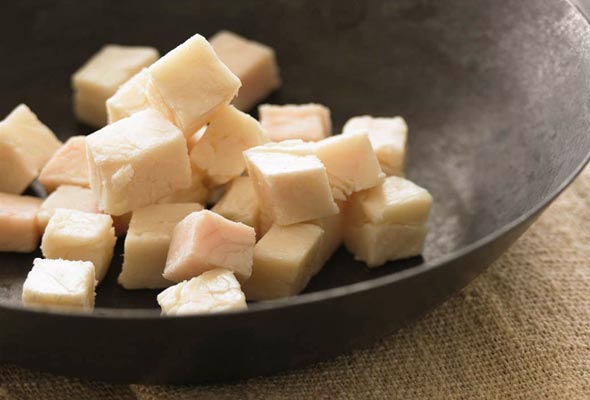
Allow me to introduce myself. I’m the Fat Lady. I worship animal fat. And before you say anything, no, my faith hasn’t made me fat. I can’t tell you my exact weight, as the only scales I own are in my kitchen, but middle-age spread has yet to appear, and I’m actually still wearing the clothes I wore ten years ago. (Aspiring authors, take note: writing cookbooks doesn’t make you rich–and doesn’t have to make you fat.) And I don’t have any problems with my cholesterol, either.
Yet when I start eulogizing fat, the reaction is unfailingly one of horror and disbelief.Most of you fear the marbling in your steak, the crisp fatty tail on a lamb chop, the crunch of a proper pork crackling. The myth that eating fat makes us fat is deeply rooted in Americans. You’re convinced that the fat will go straight from your lips to your hips and, only marginally worse, that it will kill you.
I’m here to tell you this fear is unfounded—not to mention unspeakably sad. As a chef and journalist, I know the incontrovertible importance of fat, how it’s essential not just for flavor and pleasure but, yes, your health. We’ve understood this for quite some time. Animals are fattened on a diet of grain. Humans, too, get fat on a diet of starch and sugar. Brillat-Savarin, Banting, Atkins, Scarsdale, and numerous other brilliant minds all have demonstrated that it’s carbohydrates—specifically, too many carbohydrates—that make us fat. Wanting to share this seemingly revelatory news with others, I wrote a cookbook pronouncing the glories and benefits of animal fat. Its title, not surprisingly, is Fat: An Appreciation of a Misunderstood Ingredient, With Recipes. I thought it would be easy to convince the whole world. I mean, really, how difficult could it be to tell people they can indulge in sweet butter pastry filled with homemade salted caramel and expect to live to be 100?
Pretty hard, apparently. Social indoctrination runs deep. Which is why I figured television, a medium that reaches millions, would be an ideal way to spread the word. After all, if it can persuade people to pay top dollar for bottles of purified New York City water, surely I could convince them to eat pig. So in a three-minute spot, I extolled the virtues of fat, explaining its winning combination of taste, health, and practicality. I actually had the crew drooling at my description of flaky leaf lard pastry. As I left, the producer whispered in my ear, “If you’d been even a pound overweight, we wouldn’t have had you on.” Anger tinged with evangelism overtook me. “Fat doesn’t make you fat!” I shouted. “It’s delicious, satisfying, and filling. It’s carbohydrates, sugar, and overeating that pack on the pounds! Eat fat and lose weight!” I fulminated as I left the studio.
It’s hard being a fat evangelist. There’s so much work to be done.
One morning not long ago, the local radio show host was lambasting lard. I counterattacked with a barrage of evangelizing emails. The host eventually buckled and invited me on his show. As a token of my appreciation, I pressed a jar of creamy lard into his palm during the broadcast. “That’s saturated fat,” he gasped, turning paler than the contents of the jar. I patiently explained to him and his listeners that all fats are saturated and unsaturated, even his beloved vegetable oils. Unlike highly polyunsaturated vegetable oils, which break down and turn rancid when heated, animal fats are safe when exposed to high temperatures. “Cook in animal fat!” I proclaimed at the top of my lungs as he cut to commercial.
As with many evangelists, I’ve come to learn that the masses are often converted by a subtler, more surreptitious approach. So I’ve given countless sermons on fat…cunningly disguised as cooking demonstrations. I start with the taste, tempting my nervously squirming audience with sizzling, fatty slices of pork belly or chunks of potatoes cooked in duck fat that are surreally crisp outside, ethereally airy within. Usually, even the most fat-phobic surrender with their first mouthful of creamy deliciousness. This is when they realize the truth. Fat is flavor. I tell them to repeat this mantra if their fear of fat ever returns.
Yet the mere mention of animal fat tends to make some people go a little crazy. Once, a woman in my audience actually fainted. I thought she was simply swooning in ecstasy at the sight of the duck fat gurgling happily in my pan. Alas, no. The paramedics carried her away before I had a chance to tell her that just a year ago the Harvard School of Public Health and the Research Unit at the Oakland Children’s Hospital analyzed studies of animal fat and diet spanning 25 years and eight countries. They concluded that saturated fat is not associated with an increased risk of heart or vascular disease. Hallelujah!
Even after hearing all the evidence, some aren’t swayed. I recall one young man who confessed that he’d dearly loved his grandmother’s cooking—her crisp roasted lemon chicken, her creamy mashed potatoes, her crumbly cookies—until he saw the amount of butter she used. That’s when he’d accused his granny of trying to kill him.
“But the taste?” I questioned.
“Sublime,” he sighed. Then he let what he thought were his senses get the better of him. “But all that butter is so bad for me.”
“No,” I retorted. “It’s good for you!” I explained in rather grandiose and scientific detail how butter, like all fat from ruminants allowed to graze on herbs and grass as nature intended, is brimming with properties that fight disease and actually prevent weight gain and depression. The sinner went straight to his granny’s for dinner that night.
Yet even with science, taste, and superior pastry to back me up, the disbelievers are many. So I’ve taken to a grassroots approach, converting skeptics at every opportunity. I lecture anyone fortunate enough to sit next to me in waiting rooms and airplanes. I snatch low-fat magazines from the hands of fellow subway commuters. I slip fatty-fat fat recipes to complete strangers. I’ve even stared down a room full of angry, fat-phobic dieticians. And when I see unsuspecting shoppers with low-fat items in their baskets at the supermarket, I redeem them by exorcising that evil, fat-fearing spirit that lurks within. It usually goes something like this:
“Don’t you know that fat is essential for your brain and bones?” I ask, incredulous.
They look at me as if I’m crazy. I persist.
“Many of the vitamins our bodies need are absorbed only with fat. Go back and get some full-fat milk and yogurt.” I say with authority. “It tastes better, too.”
This usually works.
One convert at a time is my motto. Although I’ve turned many into believers, I still have my work cut out for me. I won’t stop until the whole world loves and appreciates animal fat. Well, maybe not vegetarians. It’s not that I dislike them. I just think they’re misguided. Maybe I can’t help everyone.
Are you a fat-phobe or fat fanatic? Tell us your thoughts below.
.










Oh so close to my heart!!! I thought it was just me preaching the message of fat to all who will/or not listen to my ‘ravings’ A family member convinced I would kill myself with all the terrible fat I consume put the heavy word on me to have my cholesterol checked. Thankfully my Dr goes along with the saturated fat argument too. He laughed and said ‘lets do it!’ Meanwhile telling me that a cholesterol under 5 is abnormal, and that he likes his patients to have a reading between -( I hope you’r sitting down) 7 and 13!! A high cholesterol is way up around 30!!! I nearly fell off my chair. Mine came in at 7.2. Family member panics if hers is a above 5 so I crowed that I don’t have to do anything to lower it and so glad i have got off the ‘low cholesterol wagon and never have to worry about it again. From another ‘fat lady’
I’m liking what I am reading! I love fat and have always struggled with my weight! To find out now it wasn’t the fat but carbs and sugar is a relief…I can still eat fat! I am currently reading David Gillespie’s books Big Fat Lies and Sweet Poison. They are factual and very sciency but practial on how to cull fructose and vegetable oil from your diet. I’m all for fat and am now clearing my life of these horrid chemical vegetable/seed oils!! No thank you…bring on the animal fat!!
Yes, low-fat high sugar diets are damaging, because people don’t know when to stop eating.
For a complete theory of weight management, you probably need to include protein leverage, where people who have a choice seem to stop eating when they get enough protein.